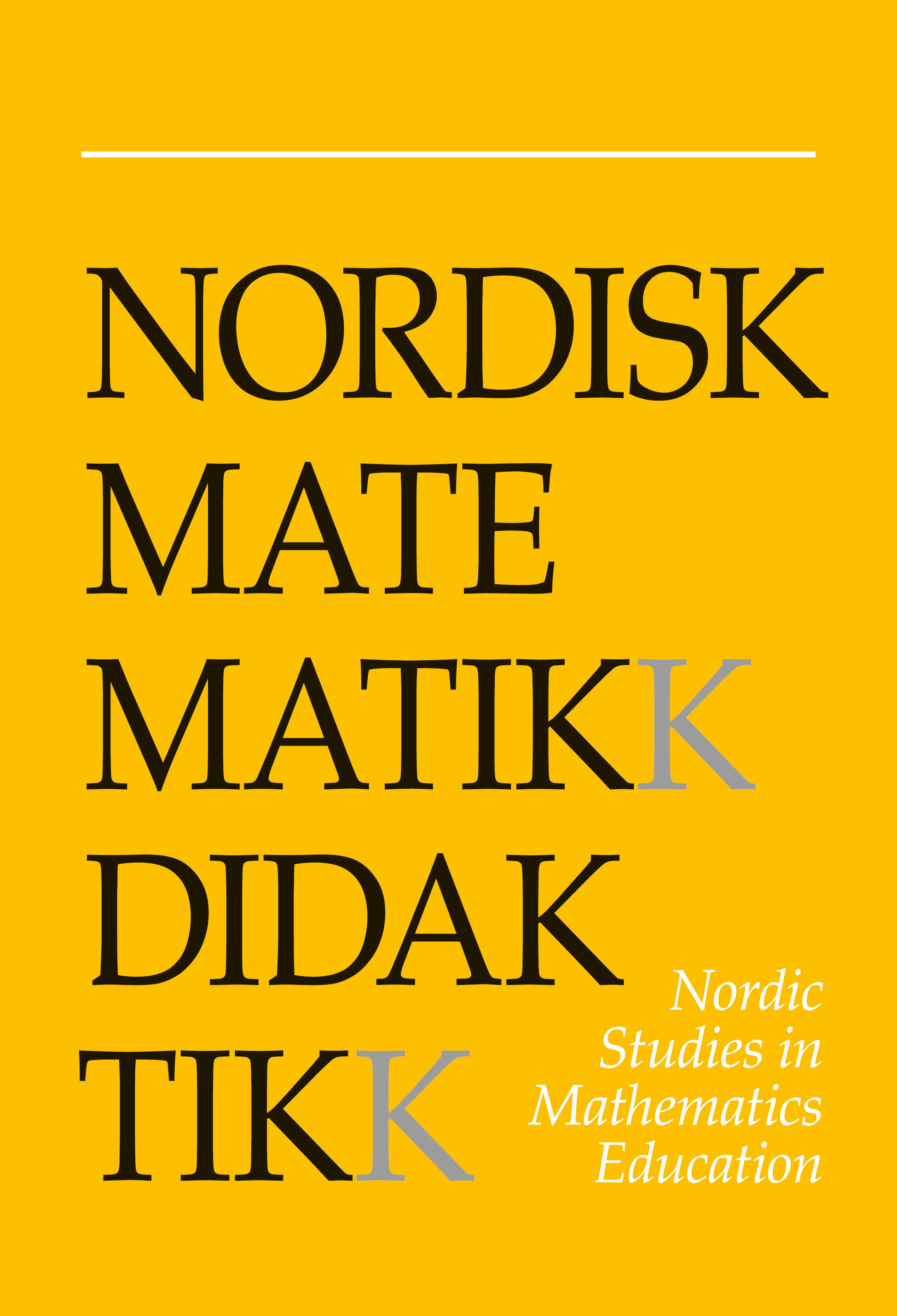Lektionsstudier i dansk læreruddannelse
DOI:
https://doi.org/10.7146/nomad.v20i1.148668Abstract
Reformtendenserne har generelt svært ved at slå igennem i grundskolens matematikundervisning. Der er derfor behov for metoder, der kan støtte lærerstuderende i at arbejde med tendenserne på måder, der rækker ud over retoriske inddragelser i uddannelsens sædvanlige undervisning. Ved at være baserede på praksisnære, kollektive praksisser (Murata, 2011), er lektionsstudier et eksempel på en sådan metode. Lektionsstudier understøtter et socialt syn på lærerviden, såsom begrebet ”knowing” (Hodgen, 2011). Ud fra analyser af en empirisk case, argumenterer vi for, at sådanne metoder er vigtige i læreruddannelsen, hvis studerende skal udvikle ”knowing” i og om reformorienteret matematikundervisning.
References
Ball, D. L. & Bass, H. (2003). Making mathematics reasonable in school. In J. Kilpatrick, G. W. Martin & D. Schifter (Eds.), A research companion to principles and standards for school mathematics (pp. 27-44). Reston: NCTM.
Ball, D. L., Thames, M. H. & Phelps, G. (2008). Content knowledge for teaching. What makes it special? Journal of Teacher Education, 59 (5), 389-407. https://doi.org/10.1177/0022487108324554
Charmaz, K. (2008). Constructionism and the Grounded theory method. In J. A. Holstein & J. F. Gubrium (Eds.), Handbook of constructionist research (pp. 397-412). New York: The Guiford Press. https://doi.org/10.4135/9781848607927.n14
Common Core State Standards Initiative (2010). Common core state standards for mathematics. Washington: National Governors Association Center for Best Practices and the Council of Chief State School Officers. Retrieved from http://www.corestandards.org/Math/
Corcoran, D. & Pepperell, S. (2011). Learning to teach mathematics using lesson study. In T. Rowland & K. Ruthven (Eds.), Mathematical knowledge in teaching (pp. 213- 230). Dordrecht: Springer. https://doi.org/10.1007/978-90-481-9766-8_13
Elipane, L. E. (2012). Integrating the essential elements of Lesson study in pre-service mathematics teacher education. University of Copenhagen.
Fernandez, M. L. & Zilliox, J. (2011). Investigating approaches to Lesson study in prospective mathematics teacher education. In L. C. Hart, A. Alston & A. Murata (Eds.), Lesson study research and practices in mathematics education (pp. 85-102). Dordrecht: Springer. https://doi.org/10.1007/978-90-481-9941-9_7
Gardner, H. (1999). Intelligence reframed: multiple intelligences for the 21st century. New York: Bacis Books.
Graeber, A. O., Newton, K. L. & Chambliss, M. J. (2012). Crossing the borders again: challenges in comparing quality instruction in mathematics and reading. Teachers College Record, 114, 0161-4681. https://doi.org/10.1177/016146811211400402
Hodgen, J. (2011). Knowing and identity: a situated theory of mathematics knowledge in teaching. In T. Rowland & K. Ruthven (Eds.), Mathematical knowledge in teaching (pp. 27-42). Dordrecht: Springer. https://doi.org/10.1007/978-90-481-9766-8_3
Lampert, M. & Cobb, P. (2003). Communication and language. In J. Kilpatrick, G. W. Martin & D. Schifter (Eds.), A research companion to principles and standards for school mathematics (pp. 237-250). Reston: NCTM.
Murata, A. (2011). Introduktion til Lesson study. In L. C. Hart, A. Alston & A. Murata (Eds.), Lesson study research and practices in mathematics education. Dordrecht: Springer.
NCTM. (2000). Principles and standards for school mathematics. Reston: National Council of Teachers of Mathematics.
OECD (2005). Teachers matter. Attracting, developing and retaining effective teachers. Paris: OECD.
Petrou, M. & Goulding, M. (2011). Conceptualising teachers' mathematical knowledge in teaching. In T. Rowland & K. Ruthven (Eds.), Mathematical knowledge in teaching (pp. 9-25). Dordrecht: Springer. https://doi.org/10.1007/978-90-481-9766-8_2
Potari, D. (2011). Response to part II: emerging issues from Lesson study approaches in prospective mathematics teacher education. In L. C. Hart, A. Alston & A. Murata (Eds.), Lesson study research and practices in mathematics education (pp. 127-132). Dordrecht: Springer. https://doi.org/10.1007/978-90-481-9941-9_10
Shulman, L. S. (1986). Those who understand. Knowledge growth in teaching. In A. S. Mayes & B. Moon (Eds.), Teaching and learning in the secondary school (pp. 125-133). Lodon: Open University. https://doi.org/10.2307/1175860
Skott, J. (2004). The forced autonomy of mathematics teachers. Educational Studies in Mathematics, 55 (1-3), 227-257. https://doi.org/10.1023/B:EDUC.0000017670.35680.88
Skott, J. (2013). Understanding the role of the teacher in emerging classroom practices: searching for patterns of participation. ZDM, 45 (4), 547-559. https://doi.org/10.1007/s11858-013-0500-z
Skott, J., Larsen, D. M. & Østergaard, C. H. (2011). From beliefs to patterns of participation - shifting the research perspective on teachers. Nordisk MatematikkDidaktikk, 16 (1-2), 29-56.
Sowder, J. T. (2007). The mathematical education and development of teachers. In F. Lester (Ed.), Second handbook of research on mathematics teaching and learning (pp. 157-224). Charlotte: Information Age Publishing.
Turner, F. & Rowland, T. (2011). The knowledge quartet as an organising framework for developing and deepening teachers' mathematical knowledge. In T. Rowland & K. Ruthven (Eds.), Mathematical knowledge in teaching (pp. 195-212). Dordrecht: Springer. https://doi.org/10.1007/978-90-481-9766-8_12
Undervisningsministeriet. (2009). Fælles mål 2009. Matematik. Faghæfte 12. Copenhagen: Undervisningsministeriet.
Van Zoest, L. R. & Bohl, J. V. (2005). Mathematics teacher identity: a framwork for understandin secondary school mathematics teaching and learning through practice. Teacher Development: An International Journal of Teachers'professional Development, 9 (3), 315-346. https://doi.org/10.1080/13664530500200271
Van Zoest, L. R., Leatham, K. & Peterson, B. (2013). Conceptualizing mathematically significant pedagogical openings to build on student thinking. In A. M. Lindmeier & A. Heinze (Eds.), Proceedings of the 37h conference of the Internatinal Group for the Psychology of Mathematics Education (pp. 345-352). Kiel: PME.
Downloads
Published
How to Cite
Issue
Section
License

This work is licensed under a Creative Commons Attribution-NonCommercial-ShareAlike 4.0 International License.



